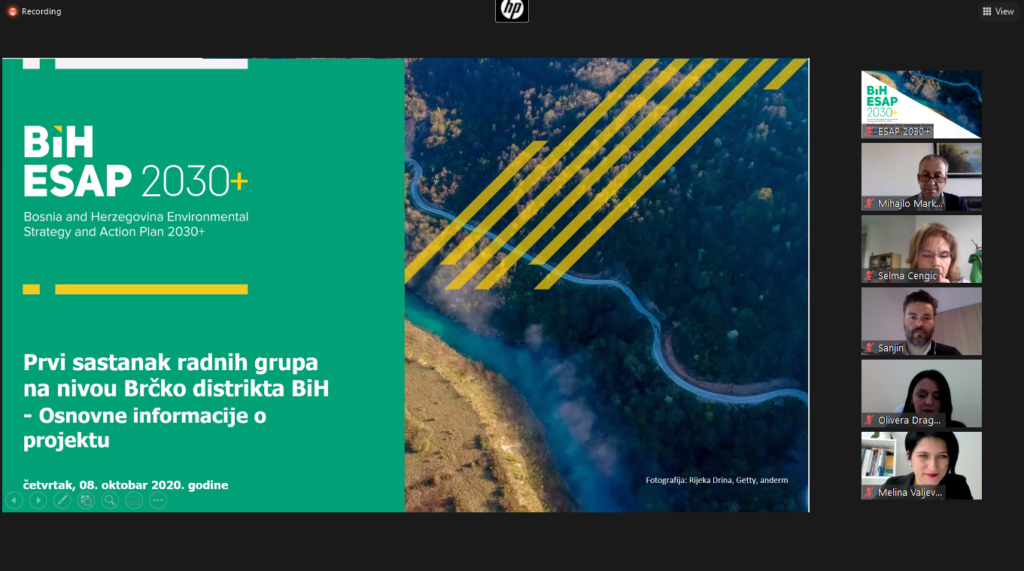Introductory session
The first round of the BiH ESAP 2030+ project’s working group meetings for the levels of Bosnia and Herzegovina (BiH), the Federation of BiH (FBiH), Republika Srpska (RS) and the Brčko District of BiH (BD BiH) was successfully finalized by holding a two-day meeting for the Brčko District of BiH level. The online meeting of the working groups at the level of the Brčko District of BiH gathered in one place more than 20 participants from the governmental, non-governmental and private sectors, as well as the academic community.
The meeting was opened by Olivera Dragutinovic, Head of the Department for Spatial Planning and Property-Legal Relations of the Brčko District, who commented on the importance of the ESAP project for BiH, both for people and the environment.
“The environmental protection strategy, through the goals and activities set out in the Action Plan, should provide long-term positive effects in the field of ecology and environmental sustainability for the benefit of present and future generations,” said Ms Dragutinovic.
Through the active work of working groups, participants identified key challenges for the seven areas of the environment, which will further feed into the development of the draft BD BiH Situation Analysis document.

A brief overview of the thematic session Sustainable Use of Natural Resources
Thematic coverage in the BiH Environmental Strategy and Action Plan spans through seven thematic areas (Water; Waste; Biodiversity and Nature Conservation; Air Quality, Climate Change and Energy; Chemical Safety and Noise; Sustainable Resource Management; and Environmental Management). The Sustainable Resource Management working group is specific because it covers a large number of natural resources such as land, forests, minerals, game and fish stock, non-timber forest products and medicinal plants. In order to identify the challenges concerning the sustainability of the use of natural resources, the pressures to which these resources are exposed to, have to be analyzed. Therefore, the analyses focus primarily on various forms of resource use, such as forestry, hunting, fishing, use of medicinal, edible and aromatic plants and non-timber forest products, different types of land use (urban development, agriculture/livestock), mineral exploitation, etc.
Based on the initial Sustainable Resource Management thematic chapter in Situation Analysis of the environment of the Brčko Districtof BiH, key challenges have been identified:
- The issue of sustainable use of natural resources is not adequately regulated. Regulations follow a sectoral approach and lack cross-sectoral harmonization. The level of compliance with EU regulations is not satisfactory.
- Lack of inclusion of sustainability issues and principles in sectoral strategies. In most cases, the focus is on sector development.
- Lack of inventory of natural resources and lack of indicators of their current state limit monitoring and sustainable planning.
- No existing sectoral strategy addresses the issue of gender equality and inclusion.
In the working part of the meeting, the members of the working group made a significant expert contribution to the identification of specific challenges. Among other things, it was emphasized that forests, as a resource, are not given adequate importance in the Brčko District of BiH and that the understanding of the multifunctional role of forests is at an extremely low level.
After the first round of working group meetings for the levels of BiH, FBiH, RS and BD BiH, the next round of meetings has been announced for the end of October and the beginning of November 2020, when further challenges and objectives for each of the seven areas will be further discussed and analyzed.







